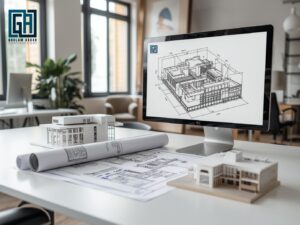Importance of Structural Planning | Smart Building
At the heart of every successful building lies structural planning—the foundation that ensures a safe, efficient, and durable project. While clients often focus on exterior finishes or interior design, it’s the structural framework that determines the true strength of a building.
At GA Construction, we believe that the importance of structural planning extends far beyond engineering; it is the critical step that transforms architectural designs into long-lasting, functional realities. Whether it’s a residential home or a commercial complex, projects without solid planning face risks of structural issues, budget overruns, and delays.

Why Structural Planning is Essential
1. Ensures Safety and Stability
The number one priority in any construction service is safety. Structural planning defines the strength of beams, foundations, and load-bearing walls to make buildings resilient against natural forces such as wind, rain, or earthquakes. A well-planned structure ensures long-term stability.
2. Improves Cost Efficiency
Budget overruns are one of the most common problems in construction. With structural planning in place, engineers can accurately estimate costs of steel, cement, and other materials. This prevents unnecessary rework and keeps projects within budget.
3. Legal Compliance
Every construction project must comply with building codes and regulations. Structural planning ensures approvals from local authorities, reduces chances of penalties, and guarantees adherence to safety standards.
4. Supports Architectural and Interior Design
Modern homes and offices require open layouts, high ceilings, and sustainable features. Structural planning makes these designs possible without compromising safety. It connects architectural creativity with construction practicality.
5. Durability and Long-Term Value
Buildings are designed to last for decades. Proper planning ensures materials are chosen wisely, reinforcements are applied where needed, and the building stands strong for future generations.
6. Efficient Time Management
Delays in construction are costly. Structural planning organizes the workflow, ensuring smooth coordination between architects, engineers, and contractors. This minimizes downtime and speeds up project completion.
Common Issues Without Structural Planning
Projects that neglect planning often face:
- Cracks in walls and ceilings.
- Weak foundations.
- Water seepage.
- Expensive redesigns.
These issues not only raise costs but also compromise safety.
Importance of Structural Planning and Sustainable Construction
The future of construction is green. Structural planning allows builders to integrate eco-friendly materials, optimize natural lighting, and design energy-efficient homes. At GA Construction, sustainability is a priority, ensuring every project balances safety with environmental responsibility.
Conclusion
The importance of structural planning cannot be overstated. It ensures safety, cost control, efficiency, and durability—making it the foundation of every successful project.
At GA Construction, we prioritize structural planning in every residential and commercial project. From initial blueprints to final execution, our commitment is to deliver safe, sustainable, and future-ready construction services.



